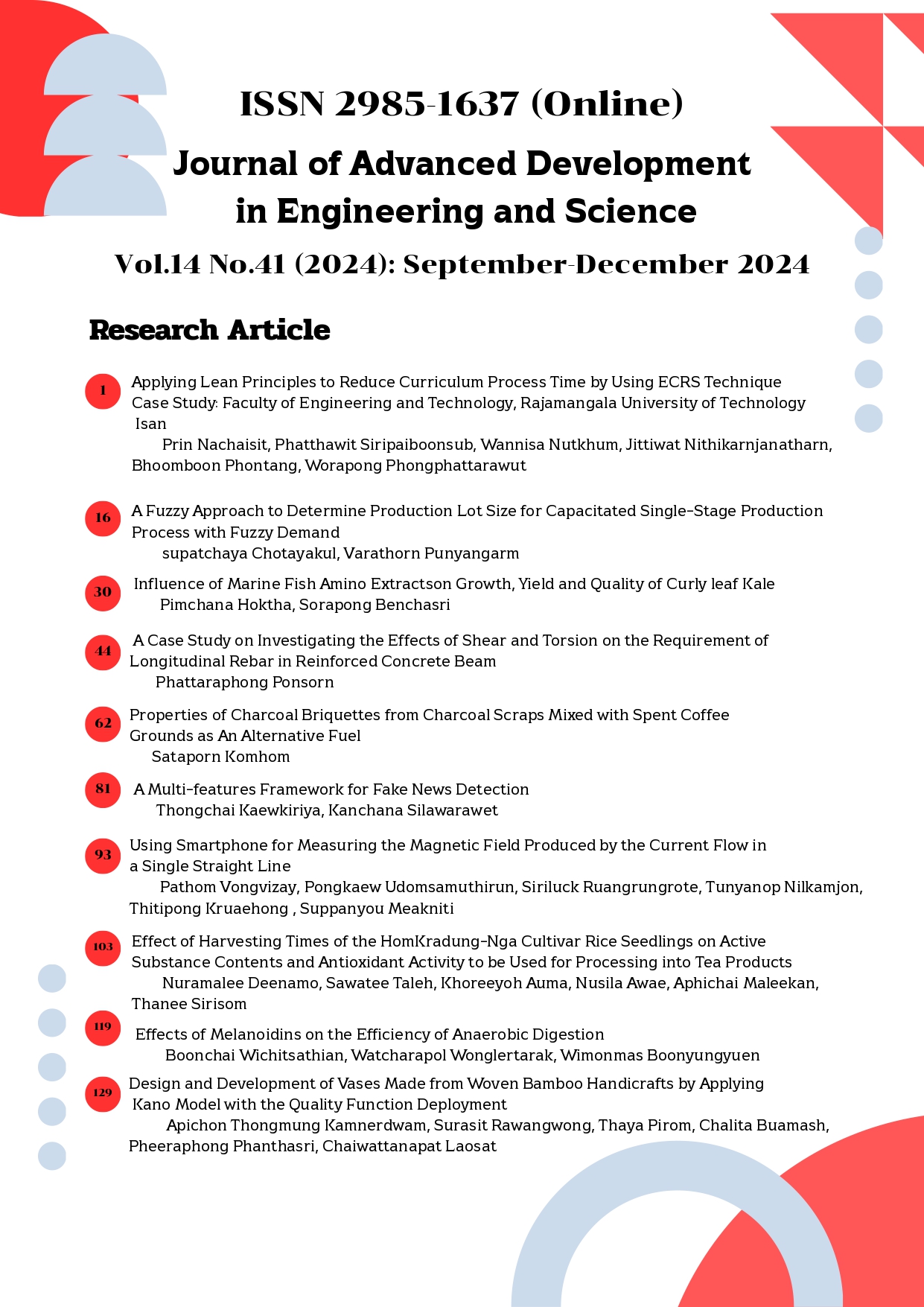Applying Lean Principles to Reduce Curriculum Process Time by Using ECRS Technique Case Study: Faculty of Engineering and Technology, Rajamangala University of Technology Isan
Main Article Content
Abstract
This study aims to apply Lean principles to reduce the time required for curriculum development at the Faculty of Engineering and Technology, Rajamangala University of Technology Isan. The time taken for activities related to the development of five curricula was gathered through interviews, document collection, surveys, and data collection forms, revealing a total of 39 activities. The average time for curriculum development was found to be 1 year and 3 months. The study then analyzed delays in the curriculum development process by examining the 7 wastes, employing cause and effect diagrams, and conducting a Failure Mode and Effect Analysis (FMEA) to determine the Risk Priority Number (RPN) and prioritize issues. Further problem analysis using the Why-Why Analysis technique led to the identification of four solutions to reduce process time: Using a Kanban system to signal delays, implementing an online information system for data delivery, applying the ECRS (Eliminate, Combine, Rearrange, Simplify) method, providing training for staff. New activities were simulated using the ECRS principles to improve processes by focusing on eliminating non-value-added activities. A comparison between some activities in the old and new processes was conducted using data collection forms. The curriculum development time was reduced from 456.69 days to 296.09 days, a decrease of 35.16%. Additionally, the risk priority number in the FMEA analysis decreased from 1310 to 606, a reduction of 53.74%.
Article Details

This work is licensed under a Creative Commons Attribution-NonCommercial-NoDerivatives 4.0 International License.
The content and information in articles published in the Journal of Advanced Development in Engineering and Science are the opinions and responsibility of the article's author. The journal editors do not need to agree or share any responsibility.
Articles, information, content, etc. that are published in the Journal of Advanced Development in Engineering and Science are copyrighted by the Journal of Advanced Development in Engineering and Science. If any person or organization wishes to publish all or any part of it or to do anything. Only prior written permission from the Journal of Advanced Development in Engineering and Science is required.
References
Browning, T. R., & Treville, S. (2021). A lean view of lean. Journal of Operations Management, 67(5), 640-652.
Wu, Y. C. (2003). Lean manufacturing: a perspective of lean suppliers. International Journal of Operations & Production Management, 23(11), 1349-1376.
Klein, L. L., et al. (2022). The Influence of Lean Management Practices on Process Effectiveness: A Quantitative Study in a Public Institution. SAGE Open, 12(1), 21582440221.
Sremcev, N., et al. (2018). Imploving teaching and learning process by applying Lean thinking. Procedia Manufacturing, 17, 595-602.
Alp, N. (2001). The lean transformation model for the education system. In: The 29th computer and engineering conference (p.82-87). 1 – 3 November, 2001, Montréal, Canada.
Comm, C. L., & Mathaisel, D. F. X. (2003), Less is more: a framework for a sustainable university. International Journal of Sustainability in Higher Education, 4(4), 314-323.
Emiliani, M. L., (2004). Improving business school curriculums by applying lean principles and practices. Quality Assurance in Education, 12(4), 175-187.
Balzer, W. K., et al. (2016). A review and perspective on Lean in higher education. Quality Assurance in Education, 24(4), 442-462.
Sunder, M. V. (2016). Constructs of Quality in Higher Education Services. International Journal of Productivity and Performance Management, 65(8), 1091-1111.
Douglas, J. A., et al. (2015) Waste Identification and Elimination in HEIs: The Role of Lean Thinking. International Journal of Quality and Reliability Management, 32(9), 970-981.
Kang, P. S., & Manyonge, L. M. (2014). Exploration of Lean principles in higher educational institutes – Based on degree of implementation and indigence. International Journal of Scientific & Engineering Research, 5(2), 831-838.
Panyathanavanich, N. (2017). Application of lean thinking to improve purchasing Process: A case of automotive industry, (Master thesis, Thammasat University). (in Thai)
Veruwanaruk, J. (2013). Improvement of overall equipment efficiency by using lean manufacturing concept and FMEA: A case study of a hard disk drive parts manufacturing company. TNI Journal of Business Administration and Languages, 1(1), 1-4. (in Thai)
Purwoharsojo, P., et al. (2020). FMEA approach of Lean Six Sigma implementation: Estimating the value of COPQ. International Journal of Psychosocial Rehabilitation, 24(3), 5592-5602.
Nino, V., et al. (2021). Improving the registration process in a healthcare facility with Lean principles. Journal of Industrial Engineering and Management, 14(3), 538-551.
Xu, P. (2021). A Spectral Two Sample Test, (Master thesis, North Dakota State University of Agriculture and Applied Science).
Jarumanee, S. (2019). Improvement of Degree Procedures and Graduation Ceremony at National Institute of Development Administration with a Lean Concept (Research reports). Bangkok: National institute of Development Administration. (in Thai)

